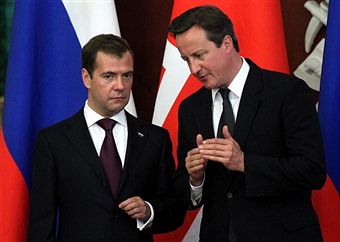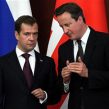
Medvedev Edges to the End of His Presidency With a Whimper
Publication: Eurasia Daily Monitor Volume: 8 Issue: 163
By:

There was a peculiar symbolism in the generally forgettable visit by British Prime Minister David Cameron to Moscow last week that was intended to draw a line under the five year-long interruption of high-level dialogue. The estrangement was caused by the heinous murder of Alexander Litvenenko in London, and Cameron decided to recommence dialogue without any concessions from Moscow regarding the non-extradition of the prime suspect in administering the lethal dose of polonium, Andrei Lugovoi, who will probably not retain his seat in the Duma after the elections in December (Kommersant, Vedomosti, September 13). At the joint press-conference, Cameron and President Dmitry Medvedev demonstrated a “quite warm, actually” rapport, but the symbolism stems from the comparison with Prime Minister Tony Blair’s visit in March 2000, when he took the first measure of Vladimir Putin and vetted him as a real leader. Then as now, disagreements over human rights issues had to be carefully bracketed out, but the updated conclusion could only be that Medvedev is a fake and failure not worth wasting time on, while Putin remains the person the West has to do business with (Moskovskiy Novosti, Moskovsky Komsomolets, September 13).
Whatever the political tensions, British companies are eager to work in Russia and have in fact invested more money in the country than their German competitors, and the only real protection for these assets could be provided by direct ties to the supreme authority. Putin subtly reasserted his possession of such authority when immediately after his meeting with Cameron, which was all business and avoided any human rights nuisance, legally sanctioned harassment of BP was stopped (Kommersant, September 13). The British energy major is accused of damaging some interests of minority shareholders following the scandalous breakdown of its attempt to build an alliance with Rosneft that was orchestrated by Deputy Prime Minister Igor Sechin and approved by Putin.
The failure of that much-trumpeted “strategic partnership” testifies to the intensity of infighting between business-political clans in Russia, but Rosneft moved quickly to strike a new deal with ExxonMobil, which was again approved by Putin (www.gazeta.ru, September 1). The Russian oil-and-gas sector is bedeviled by fast rising production costs and excessive state control is one of the key drivers of this trend, but Putin seeks to lure Western investors by selling the success of the Nord Stream project as the controversial pipeline across the Baltic Sea begins to pump gas to Germany (Kommersant-Dengi, September 12).
Medvedev has no role in this mechanism of hands-on management of revenues and property re-distribution; his pretense of charting the course toward modernization has lost any plausibility, which was perhaps the deepest bottom line from the Yaroslavl forum last week (Nezavisimaya Gazeta, September 9). This pompous event was invented as a platform for the modernizer-president to present his vision of a re-energized Russia, but he failed to deliver any meaningful content, so that the large crowd of politicians and their retinue was left with a few sound-bites like “extremist class struggle doctrine” (Vedomosti, 8 September). This year, the forum was cheerless because of the tragic air crash in which the whole Yaroslavl hockey team perished and Medvedev could have focused in his speech on the acute problems generated by the decaying Soviet infrastructure and the self-serving state bureaucracy, a combination that sustains the chain of man-made disasters. Instead, he stuck to the smooth text, and his measured bold words, like “it is very tempting to begin ‘tightening the screws’ once again,” fell flat (www.gazeta.ru, September 8).
Putin appears firmly set on tightening the bureaucratic screws while simultaneously expanding the package of populist promises. He proceeds with reshuffling the regional level of governance postponing the changes in the government until after the elections and uses Medvedev as the front figure in the complicated cadre maneuverings like installing the feckless but loyal Georgy Poltavchenko as the governor of St. Petersburg (The Moscow Times, September 13). It is hard to decipher the changes in the presidential administration where Konstantin Kostin was promoted to the head of the internal policy department and Oleg Govorun was removed from this post to take charge of the Central federal district, but they confirm that Medvedev is not building a motivated electoral team (Kommersant, September 13). Putin, on the contrary, is carefully preparing the congress of the United Russia party later this month dumping some ineffectual bureaucrats and contemplating the proposition to strengthen the nationalistic appeal by returning Dmitry Rogozin to the State Duma as one of the figureheads of the newly-created Popular Front (Nezavisimaya Gazeta, September 13).
Putin is aware that the majority of Russians see the “dirty” elections as a form of competition between bureaucratic clans for access to rents, while two thirds of the electorate wants a massive change in the corps of parliamentarians (www.levada.ru, September 13). He relies not so much on the mobilization of the core support groups as on general passivity among voters and seeks to prevent the evaporation of boredom due to raising irritation by the lack of real choices. Economic problems influence the behavior of the electorate in Russia less strongly than in the US, since voters tend to rely on the state for providing solutions, but Putin takes no chances with talking these problems away and has ordered a postponement of the annual price increases on electricity and communal tariffs from January to July (Moskovsky Komsomolets, September 14). Even his long-serving Finance Minister Aleksei Kudrin admits that the game of pre-election give-aways is too costly for the budget, which makes a rise in taxes inevitable (www.gazeta.ru, September 13).
It is too obvious that Medvedev is out of his depth in tackling the macro-economic issues tightly intertwined with squabbles between political clans; he may also be over-playing his ineffectuality in order to convince Putin that it is safe to let him stay for another presidential term. It is less obvious that Putin is also out of his depth and is over-playing his bossiness in order to hide a lack of real control. Elections are set to decide nothing and leave Russia with no chance of addressing its internal conflicts by democratic means.




